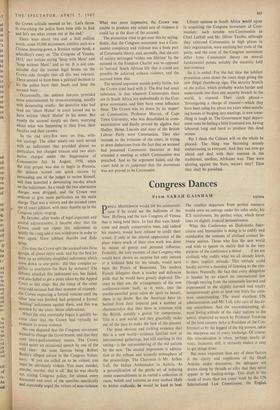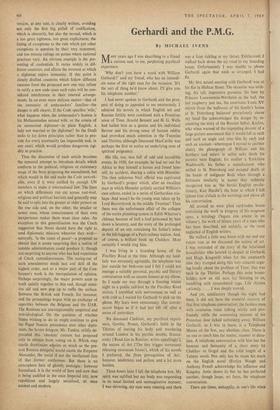Congress Dances
From SARAH GAINHAM VIENNA
nRINCE METTERNICH would lift his aristocratic r nose if he could see the ballroom of the 'New' Hofburg and the new Congress of Vienna that is being held there. In fact that vain, hand- some and deeply conservative man, and indeed his masters, would have refused to credit their senses, if only at the altered appearance of the place where much of their own work was done by means of gossip and personal influence. Probably, the only member of that Congress who would have shown no surprise but only interest at a widened field for his talents, would have been the Prince of Benevento. The modern French delegates show a touchy and defensive pride that he would have greatly deplored. Dis- creet as they are, the arrangements of the new conference-room built, as it were, into the marble-panelled great salon do spoil its beauty, there is no doubt. But the Austrians have in- herited from their imperial past a number of characteristics that they have in common with the British, notably a genius for compromise. This is a new world, and they gracefully make use of the past to make the best of the present.
The most obvious and striking evidence that this is a new world—evidence familiar now at international gatherings, but still startling in this setting—is the out-numbering of the old nations -by the new. The second impression is admira- tion at the urbane and leisurely atmosphere of the proceedings. The Chairman is Mr. Arthur Lall, the Indian Ambassador to Austria. As a personification of the gentle art of inducing sweet reasonableness in as varied a collection of races, beliefs and customs as ever seethed likely to bicker endlessly, he would be hard to beat. The smallest departure from perfect manners would seem an outrage under his calm smile, his ICS incisiveness, his perfect voice, which never loses its slightly ironical persuasiveness.
What this Conference on Diplomatic Inter- course and Immunities is doing is to codify and standardise the customs of civilised contact be- tween nations. Those who fear the new world and wish to ignore its reality find in the very purpose of the conference a threat . . . if we are civilised, why codify what we all already know, is their implicit attitude. This attitude could hardly survive a morning of listening to the con- ference. Naturally, the fact that every delegation is headed by an expert on international law (though varying from the immensely learned and experienced to the slightly learned and totally inexperienced) gives at least one basis for com- mon understanding. Tie usual excellent UN administration, and Mr. Lall, take care of day-to- day smoothness. And the uncondescending, al- most loving attitude of the older nations to the newer, displayed as much by Professor Verdross of the host country (who is President of the Con- ference) as by the biggest of the big powers, takes the sharpness out of every exchange. Of course, this consideration is often, perhaps nearly al- ways, insincere; still, it certainly makes it easy to get things done.
But more important than any of these factors is the clarity and suppleness of the Draft Articles under discussion; the delegates are drawn along by threads so silky that they never appear to be leading-strings. This draft is the result of more than ten years' work by the UN International Law Commission; the English version, at any rate, is clearly written, avoiding not only the first big pitfall of codification, which is obscurity, but also the second, which is a too great tightness, too great explicitness; the listing of exceptions to the rule which put other exceptions in question by their very statement; and too minute rulings on points where national practices vary. An obvious example is the pre- senting of credentials. It varies widely in dif- ferent countries, and affects the moment at which a diplomat enjoys immunity. If this point is closely drafted countries which follow different customs from the proposed new one may refuse to ratify a new code since such rules will be con- sidered interference in their internal arrange- ments. In an even more delicate matter—that of the immunity of ambassadors' families—the danger is still clearer. If the Code specifies 'wife,' what happens when the ambassador's hostess is his Mohammedan second wife, or the cousin of an unmarried diplomat—in plain English, a lady not married to the diplomat? So the Draft seeks to lay down principles rather than to pro- vide for every eventuality (an impossible task, in any case), which would produce dangerous rigi- dity in practice.
Thus the discussion of each article becoines the repeated attempt to introduce details which conform to the political, religious or customary usage of the State proposing the amendment, but which would in the end make the Code unwork- able, even if it were ratified by enough UN members to make it international law. The lines on which differences run cut across east-west, religious and political barriers and generally may be said to split into the greater or older powers on the one side and, on the other, the smaller or newer ones, whose consciousness of their own inexperience makes them want clear rules. An exception to this generalisation was the Czech suggestion that States should have the right to send diplomatic missions wherever they wish— naturally, 'in the cause of peace'—a proposal so absurd that it seems surprising that a nation of notable administrators could produce it; though not surprising to anyone who has had experience of Czech cantankerousness. The easing-out of such amendments needs tact and skill of the highest order, and so a major part of the Con- ference's work is the manipulation of opinion. Perhaps surprisingly, the major powers seem to work quietly together to this end, though enmi- ties old and new • pop up to ruffle the surface. Between the British and French, for instance; and the proceedings began with an exchange of asperities between the Belgians and the UAR. The Russians are unexceptionably empirical and non-ideological. On the question of whether States wishing to do so might continue to give the Papal Nuncio precedence over other diplo- mats, the Soviet delegate, Mr. Tunkin, mildly de- precated this 'obsolete', custom but proposed only to abstain from voting on it. Which may startle doctrinaire atheists as much as the pre- sent Russian delegates would startle the Emperor Alexander, the social if not the intellectual lion of that former conference. But there is no atmosphere here of ghostly nostalgia: however formalised, it is the world of here and now that is being codified in the once Imperial city, now republican and largely socialised, at once ancient and modern.







































 Previous page
Previous page